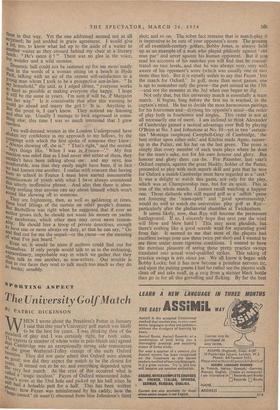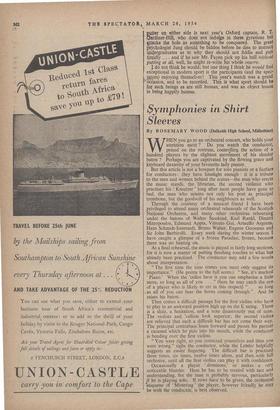The University Golf Match PATRIC DICKINSON HEN I wrote about
the President's Putter in January I said that this year's'University golf match was likely to be the best for years. I was thinking then of the shot; and so on. The sober fact remains that in match-play it ' is imperative to be sure of your opponent's score. The greate of all twentieth-century golfers, Bobby Jones, is always held up as an example of a man who played pitilessly against old man par' and never against his human opponent. But if you, read his accounts of his matches you will find that he concen- trated on two levels, and that he was always very, very well aware of his opponent's score (which was usually one or two more than his). But it is equally unfair to say that Fayen ' lost the match for Oxford.' In golf, more than most games. one is apt to remember only the grave—the putt missed at the 17th —and not the moment at the 3rd when one began to dig.
Not only that, but this university match is essentially a team match. It begins, long before the first tee is reached, in the captain's mind. He has to decide the most harmonious pairings, for his foursomes and—divining his opposite's mind—the order of play both in foursomes and singles. This order is not at all necessarily one of merit. I am inclined to think Alexander of Cambridge gained a tactical advantage over Bull by playing O'Brien at No. 3 and Johnstone at No: 10—yet in two certain- ties' Montagu outplayed Campbell-Gray of Cambridge, the best striker upon either side,' and Kitchin made Agate, runner- up in the Putter, eat his hat on the last green. The point is simply that every member of each team plays where he does for the team's sake, not for his own honour and glory. But honour and glory there can -be. For Pitamber, last year's Oxford captain, against the great Huddy, holder of the Putter, proceeded to play with such superb skill and guts that he won for Oxford a match Cambridge must have regarded as a cert.' It was a delight to watch this game, not only for the play, which was at Championship rate, but for its. spirit. This is true of the whole match. I cannot recall watching a happier one. Those diehards who still regard golf as a selfish' game not fostering the team-spirit' and good sportsmanship,' would do, well to watch the universities play golf at Rye— particularly after the gladiatorial shambles at Twickenham.
It seems likely, now, that Rye will become the permanent battleground. If so, I sincerely hope that next year the wind will blow and blow hard ! This may seem ghoulish, but there's nothing like a good seaside wind for separating good from fair. It seemed to me that most of the players had excellent swings (one saw them twice per shot) and I wanted to see them under more rigorous conditions. I wanted to have the mordant pleasure of seeing those pretty practice swings translated into actual wind-qualified strikes. This taking of practice swings is tres vieux jets. We all know it began with Bobby Locke, but it has now become a pointless nervous tic, and upon the putting greens I had far rather see the players walk clean off and take snuff, or a swig from a sinister black bottle than go in for all this grovelling and flicking. By far the best gutter on either side is next year's Gxford captain, R. T, Qardiner-Hill, who does not indulge in these gyrations but Attacks the hole as something to be conquered. The great psychologist Jung should be bidden before he dies to instruct undergraduates as to why they should not fiddle and putt timidly. . . and if he saw Mr. Fayen pick up his ball without puttinc at all, well, he might re-write his whole oeuvre, I do not think he would; but one thing I think he would find exceptional in modern sport is the participants (and the spec• jp.tyrs) enjoying themselves! This year's match was a grand 'occasion, and to be recorded. This is what sport should bo for such beings as are still human, and was an object lesson in being happily human.











































 Previous page
Previous page